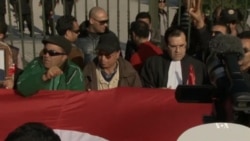The Islamic State group has claimed responsibility for the deadly attack on Tunisia's national museum that killed 23 people, mostly foreign tourists.
The Islamist group’s statement described the attack as a “blessed invasion of one of the dens of infidels and vice in Muslim Tunisia.” It was posted in an online forum that carries messages from the group. The U.S.-based SITE Intelligence Group reported the message appeared to be authentic.
Earlier Thursday, Tunisian authorities said they arrested nine people in connection with the massacre at Tunisia's Bardo national museum. No details about the suspects were immediately disclosed.
Security forces shot dead two gunmen at the scene of the attack Wednesday, and said afterwards they were searching for their accomplices.
The slain gunmen were identified as Yassine Laabidi and Hatem Khachnaoui. Witnesses said they had been shooting at tourists outside the National Bardo Museum and rounded up others as hostages.
Among the dead were 20 foreign national tourists and three Tunisians, government officials said Thursday.
"The target of the attack was the parliament and the national museum," Parliament President Mohamed Ennaceur said during a special session late Wednesday. "These are symbols and this attack was a message to tell us that terrorism today has changed in that it has a presence in the city and is eyeing our national symbols."
The shooters were wearing military-style uniforms when they "hunted and chased down" tourists at the museum, Prime Minister Habib Essid said.
Three Japanese citizens were killed. Other foreigners among the dead were from Germany, Italy, Poland, Spain and Colombia.
Spain said a Spanish couple -- including a pregnant woman -- were found alive Thursday after spending the night hiding inside the Bardo with a museum guard.
Watch video report from VOA's Zlatica Hoke:
Tunisian television showed images of older tourists and children fleeing the scene under the cover of armed security forces. A spokesman for the Interior Ministry said at least 100 people were inside the museum at the time of the attack.
In a television address to the nation late Wednesday, President Beji Caid Essebsi said, "I want the people of Tunisia to understand firstly and lastly that we are in a war with terror, and these savage minority groups will not frighten us.''
Tunisia is heavily reliant on foreign tourists. Some media reported Tunisia's parliament, which meets in a building near the museum, had been debating legislation to combat terrorism as the attack began.
Said Sadek, a Cairo-based professor of political sociology, told VOA that militants in Tunisia have in the past targeted security forces, making Wednesday’s attack especially disturbing.
“Terrorists pick targets because they know it will have certain impacts. It’s not just killing unknown tourists in a museum. They want to kill Tunisia. The want to kill the economy of Tunisia. So this is really the target," Sadek said.
Tunisians overthrew Zine El-Abidine Ben Ali in 2011 and kicked off the Arab Spring revolutions that spread across the region. In the past four years, Tunisia has completed its transition to democracy with free elections, a new constitution and compromise politics between secular and Islamist parties.
But security forces are battling Islamist militants including Ansar al Sharia, which is listed as a terrorist group by Washington, and Okba Ibn Nafaa, a brigade of al-Qaida-affiliated fighters operating in the Chaambi mountains along the Algerian border.
World reaction
U.S. Secretary of State John Kerry was among officials around the world who also condemned the attack and offered support for Tunisia.
"We commend Tunisian authorities’ rapid response to today’s wanton violence and their efforts to resolve the hostage situation and restore calm," Kerry said in an emailed statement.
In London, British Prime Minister David Cameron called the attack "the latest example of extremist terror," and said "we have to fight it with everything we have."
The United Nations Security Council strongly condemned the shootings.
"The members of the Security Council stressed that no terrorist attack can reverse the path of Tunisia towards democracy and all efforts directed towards economic recovery and development," read a statement from the council.
French President Francois Hollande he asked Interior Minister Bernard Cazeneuve to go to Tunisia "to reinforce the security cooperation with the Tunisians."
EU foreign policy chief Frederica Mogherini said she offered Tunisia "all the EU's support, not only in the security and counterterrorism fields, but also in the fields of the democratic process, of the economic reconstruction and of the investment on the future of young Tunisians."
Jeff Seldin contributed to this report from the Pentagon. Some material for this report came from Reuters, AP and AFP.







